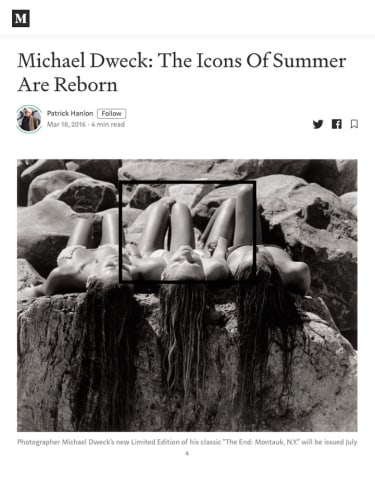Michael Dweck: The Icons Of Summer Are Reborn
Medium
03/18/2016
Back
By: Patrick Hanlon
Summer is the most desirable season. Sun scours the air until it is clean and fine, perfect for photography. There is a field of sun-sparkled sand and the ocean rises to meet it across acres of sparkling light. The sky is bright as a lens flare. Summer is filled with memes: Running on the beach. Convertibles. Articulated sunsets. Bubbles in a glass. Bikini butts.
Photographer Michael Dweck has chosen this season a second time in his redux of The End: Montauk, N.Y., his 2004 photography classic (his edition of 5,000 in 2004 sold out in three weeks).
The new edition, which becomes available July 4 from Ditch Plains Press, is even sweeter: autographed, printed on Italian Garda paper and enclosed in a handmade Japanese box. There are also an additional 85 new photographs not included in the original 2004 edition. Each book in the short run Limited Edition (only 300 copies are available at $3,000 each) is numbered and signed by Michael Dweck and also includes a numbered and signed 11” x 14” silver gelatin print.
Dweck originally concepted The End: Montauk, N.Y. in 2004 as an attempt to freeze time. “I knew Montauk would change,” says Dweck. “And I wanted to capture the way Montauk made me feel. I didn’t want it to be sentimental or nostalgic. I wanted that collection of images to freeze Montauk.”
He shifts and continues.
“I had been going there since my sophomore year in high school,” remembers Dweck. “I could hide out there with my friends. My first trip was when I heard that the Rolling Stones were hanging out with Andy Warhol. When went searching for the Rolling Stones and found this inlet with surfers. That hidden spot began my romance with Montauk.”
Dweck is quick to point out that his work is not a documentary. “I’m not interested in documentary photography at all,” he says. His art is not a search for truth, but truth filtered through the lens of his own perspective. “I’m constructing the shot. I choose the models. I have the images in my mind before I make them. I’m taking my idealized point of view and putting that out there.”
You could argue effectively that because this is not documentary, and because Dweck admits every scene has been staged, that his people are objectified. Some complained that the first edition of The End: Montauk, N.Y. sold out quickly because of the shots of naked women. Example? The book’s most iconic photo depicts a woman sprinting toward the waves, a surfboard tucked under her wing. She is naked, everything about her exposed in a motion-filled micromoment. Matisse at the beach.
Dweck’s scenes may be amorous, naked, fantastical, but his women are real. The scenes are a beachside backyard Eden. Clean and freshly effervescent with Coca-Cola bubbles rather than champagne. If anyone wants to politicize the moment, let’s just say that we prefer this woman young, beautiful and alive rather than tortured and burned simply for being a woman, as she might be on the judgmentally darker, more righteous side of the planet.
So be it.
These days, Dweck divides his time between Montauk and New York City. His other books, including Mermaids and Habana Libre, have also been incredibly popular. Are they also due for re-release?
“I’m not sure,” says Dweck. “Habana is also my idealized view, and Havana has completely changed in the last year and a half.” Dweck hesitates. “It’s a possibility.”
The new 11x14-inch edition of The End: Montauk, N.Y. becomes available July 4, 2016. A portion of sales will be donated to Surfrider Foundation, Ocean Conservancy and Splash, charities that help keep oceans clean.
Dweck’s photography is an act of preservation. He saw the Montauk beach life he had experienced as a youth disappearing thanks to developers crabbing toward the Easternmost points of Long Island. Montauk is still their last resort.
“If my book, even in some small way, hastens the demise of the lifestyle it seeks to glorify,” says Dweck, “then I’ve shot myself in the foot.”
Summer is coming, god bless us everyone.